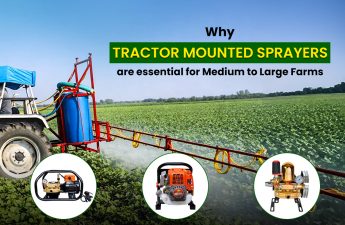Agricultural practices have long strained natural resources due to growing demands for food and shelter from a rapidly increasing population. This has led to issues like pollution, soil degradation, and wildlife decline. With population growth, technology plays an important role in tackling these issues. Advancements in agriculture, like technology of cutter machine and mechanization, have stretched productivity, minimized losses, and enhanced crop production. These are the advancements that are making a powerful contribution in helping farmers to reduce expenses, receive higher revenues, and, therefore, perform a significant function in sustainable agriculture for the future.
- Better Resource and Labor Management
Smart farming tools, like crop cutters and pickers, help farmers manage labor more efficiently and increase their harvest. For instance, mushroom farmers have seen a 10% boost in yield. These tools also ensure crops are harvested at the right time, reducing waste. However, automated picking isn’t ideal for every crop, and some smaller farms might find the cost too high. Farmers face a tough decision: invest in this tech or stick to traditional labor, which can significantly affect their farm’s operations.
- Resilient Crops Through Biotechnology
Biotechnology in agriculture involves techniques such as genetic engineering and conventional breeding to come up with better plants and animals. Through genetic engineering, biologists can increase the pest resistance of crops and also develop high-yielding varieties. Although there has been resistance to some of these measures, biotechnology is a crucial component in the advancement of farming, particularly in the existing climate and growing human inhabitants.
- Targeted Precision Farming
Precision farming has many uses, and farmers are using it to combat their rapidly spreading enemy—the pear cactus. While herbicides can help, traditional spraying methods and often waste chemicals. With smart farming, new tools now combine weather data, imagery, and GIS to apply herbicide precisely where needed. This targeted approach allows farmers to reclaim valuable grazing land while protecting useful plants, like white clover, in the process.
- Efficient Water Management
Modern water management systems help farmers monitor and conserve water by using technologies like automated irrigation and moisture sensors. These tools ensure that crops receive the right amount of water, reducing waste and saving costs. Increased water shortage transcends many regions, and hence proper water management is essential to support agriculture and crop production. Besides, cutter machine can enhance crops quality too.
- Management and Sustainability
Wireless monitoring systems also help farmers manage irrigation and water, chemicals, and electricity to achieve more efficient farming. These systems enable the reduction of water usage, fuel, and electrical power hence control of expenses while exercising sustainable agriculture.
Indeed, advanced technology like cutting machine can be money and time-saving options but if you want to make your agriculture process advanced, acquire knowledge on using them for lasting results.
Conclusion
In India, farming heavily relies on nature, but climate change and global warming make it unpredictable. To tackle this, farmers need to learn about modern technology and innovative methods to boost productivity and profits. If you’re thinking about investing in new farm technology like crop cutter, PadCorp can assist. Our team helps farmers improve their operations while keeping costs and debt low, ensuring a more sustainable future.



